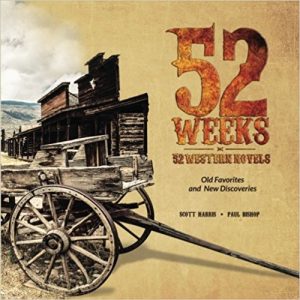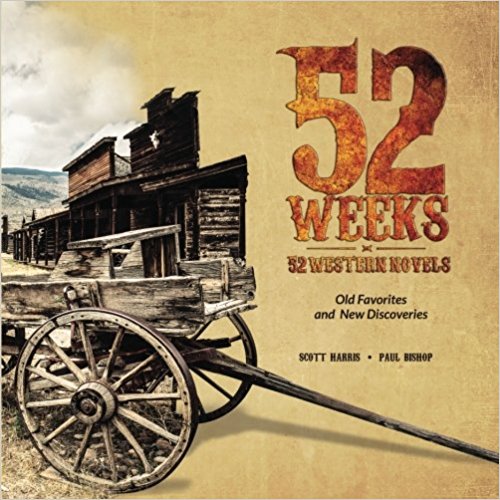52 WEEKS & 52 WESTERN NOVELS edited by Scott Harris & Paul Bishop. First, I have to admit a bias. The coauthor of this book, Paul Bishop, is an old friend of mine and many of the authors profiled, and the contributors who wrote about them, are my friends, too. Also one of the books covered, OUTRAGE AT BLANCO, is published by Brash Books, a company I co-founded. All that said, I love this book and I believe I would even if I didn’t know so many of the people involved.
 If I were really industrious, I’d list 52 reasons why this slick, beautifully designed book is a must-have for western fans…especially those who are just getting into the genre. #1 on my list would be that it offers a great overview of key western novels that offer a wide-ranging perspective on the genre. #2 would be that each entry is affectionately, and knowledgeably written by either well-read experts in the genre or acclaimed western authors. #3 would be that even long-time western fans will learn some interesting facts about books and authors they thought they knew everything about. Count me among them. This book is packed with information and will make you want to read, or re-read, every single title.
If I were really industrious, I’d list 52 reasons why this slick, beautifully designed book is a must-have for western fans…especially those who are just getting into the genre. #1 on my list would be that it offers a great overview of key western novels that offer a wide-ranging perspective on the genre. #2 would be that each entry is affectionately, and knowledgeably written by either well-read experts in the genre or acclaimed western authors. #3 would be that even long-time western fans will learn some interesting facts about books and authors they thought they knew everything about. Count me among them. This book is packed with information and will make you want to read, or re-read, every single title.
It’s not clear to me how the 52 books that are covered were chosen…or why some authors get two or more listings (like Claire Huffaker, Marvin Albert and Louis L’Amour) while other landmark authors/novels aren’t listed at all (like Larry McMurtry’s LONESOME DOVE and A.B. Guthrie‘s THE WAY WEST, for example). There are lots of well-known titles (especially among western fans) and many obscure ones that were new to me (and that I am eager to read!).
If I have a criticism, it’s that the write-ups can be a bit too familiar at times, with the contributors talking too much about themselves or about how they know the authors (“I’ve had the great pleasure to get to know Arnold and his wife Bonnie over the years” or “Bill and I first met through the pages of fanzines” etc). I also wish the two editors had resisted the urge to refer to their own western novels (“In my own series of western books…”) in write-ups of other books or to have their books included in the listings — it gives the book an unnecessary, self-promotional aspect that detracts from the overall professionalism of the endeavour.
But those are minor quibbles. The passion the editors and their contributors have for the genre, and for these books, is palpable. This isn’t a dry, stodgy reference work. It’s a fun read, written in a casual, energetic style that makes you feel like you’re having dinner with a group of really smart, really passionate western fans who can’t stop talking about the books they love…and that they want you to love as much as they do.

For decades I have greatly admired the talents of certain exceptional reviewers of books. You, Lee, demonstrate here one more reason to honor the gifts of honed analyses and precisely worded language that the best of reviewers offer readers. You’re honest, forthright, and helpful, and the enthusiasm you share across the literary landscape resonates in your review of 52 WEEKS & 52 WESTERN NOVELS, as shown in this snippet: “It’s a fun read, written in a casual, energetic style that makes you feel like you’re having dinner with a group of really smart, really passionate western fans who can’t stop talking about the books they love.” I enjoy reading all your opinions about shows, movies, or books. Thanks for taking the time to let us in on this one.
My early reading was Edgar Rice Burroughs, Andre Norton and Fran Striker. Burroughs, who write a Western or two in his career and Striker, the author of the Lone Ranger books, were hopefully mentioned in the book. Burroughs and Tarzan were a mainstay in my bedroom late at night with a flashlight under the covers. Norton was my gateway to SF, starting with The TIme Traders. I read a LOT of Burroughs and Norton. But the most vivid memories I have of reading, was with a set of the first ten Striker books featuring the Lone Ranger … especially The Lone Ranger and the Haunted Gulch. That set of hardcover originals was bequested to me by my paternal grandfather, who I never met, but knew I’d be a reader when I did arrive in this world and left me the books.
Good guys were good guys and bad guys were bad guys in those books. Simpler levels of understanding right and wrong in the world were ideal to a pre-teen reader like myself. Striker might not be the first name in Western writing these days. But for an old fogey like myself, I could not imagine a list of 52 books featuring Western themes that would NOT include him.
I think I might pick up the book to see if any other memories might get stirred up. If the book has enough breadth to NOT include Lonesome Dove, then maybe it’s closer to my sweet spot of old-timey writing. Thanks for pointing the book out, Lee.